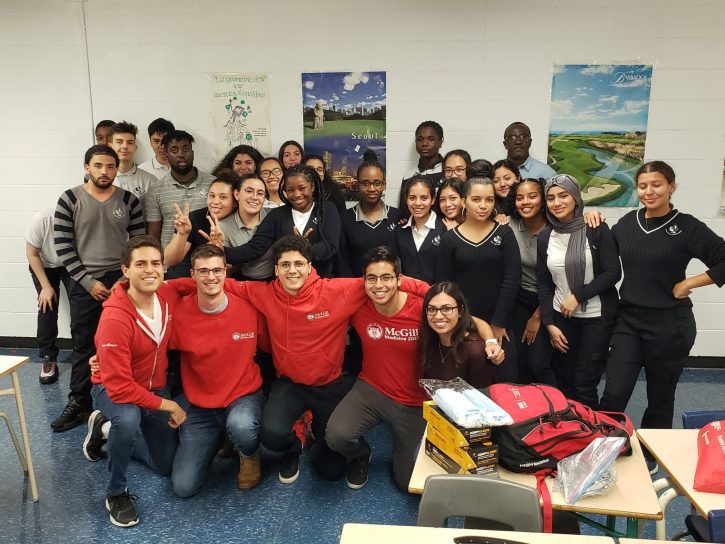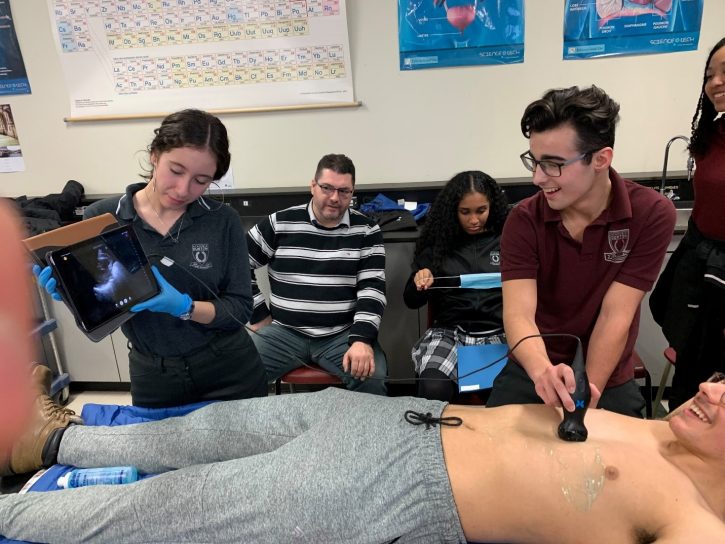New outreach project allows students to feel like doctors for a day
By Lisa Dutton
For years, Canadian medical schools have been working hard to ensure the next generation of doctors better reflects the diversity of the country’s population. Numerous efforts are underway to recruit from traditionally underrepresented populations including Indigenous students, black students and students from lower socioeconomic status (SES) backgrounds. The work is paying off, as the medical student bodies at McGill, and at other schools across the country, increasingly resemble the populations served. This diversity is excellent news for Canadians because health care providers from a wide range of backgrounds and life experiences are better able to understand the needs, concerns and barriers to care experienced by some of their patients.
At McGill, two medical students, Sami Chergui and Antoine Denis, are doing their part to encourage students from low socioeconomic backgrounds to consider careers in health care. The second-year med students launched Academic Immersion in Medicine (AIM) to motivate high school students living in some of Montreal’s poorer neighbourhoods to consider careers in medicine, nursing, physical therapy, etc.
Sami and Antoine developed a roadshow for Secondary 3 to 5 students. It comprises interactive workshops and immersive simulations in an “emergency care setting.” So far, they and their small core of volunteers have presented to 200 students from three Montreal area high schools. They teach the basics of suturing wounds and using an ultrasound machine. They also give a brief presentation about various health care careers and the possible academic paths to studying in these fields and take questions from students and teachers.
“The vast majority of students were extremely excited about the workshop because, as they said, they got to do ‘the stuff from Grey’s Anatomy.’ It is nice to see the friendly competition between students who try to surpass each other in speed and quality for their suturing,” says Sami. “Surprisingly, the ultrasound portion of the workshop is an even bigger hit than the suturing. The students really liked to see the organs they studied during their human biology classes.”
Antoine explains why the pair started the project, “We noticed that certain groups such as those with a lower SES or certain ethnic minorities are often underrepresented in medical programs. In addition, studies shows that students of low SES are more prone to ‘associate medical school with elitism and privilege and consider medical school to be unattainable for someone in their position (Richardson 2009). We feel that the lack of diversity within medical schools could eventually lead graduating doctors who may not be able to relate to specific patient populations. That is why we took it upon ourselves to try to encourage high school students from some of Montreal’s poorer neighbourhoods to consider a career in health.”
“Outreach efforts such as what Sami and Antoine have developed, are essential for reasons of equity within the Faculty of Medicine, but also for the future benefit of patients,” says Dr. Nicole Li-Jessen, Chair of the Widening Participation Committee of the Social Accountability and Community Engagement Office (SACE) at McGill.
Dr. Pascale Caidor, Diversity and Engagement Program Officer of SACE points out that several studies show that physicians from lower socioeconomic backgrounds are more likely to pursue primary care specialties and work with under-served populations. Also, physicians that are fully engaged in the community they serve can more easily identify key health priorities and commit to incorporating these issues into their educational and research projects.
Rapid growth and recruitment opportunities
The pair of entrepreneurial students have found more success than anticipated and consequently the demand for workshops is exceeding their team’s ability to deliver. To keep up and to offer more sessions in more schools, they are looking to recruit volunteers from all schools within the Faculty of Medicine.
“We are looking for around five long-term volunteers to help with the organizational aspects of the workshops. We are also looking for at least ten people to conduct the workshops. No matter the amount of time you can invest, your help is welcome,” says Sami.
If you are keen to help spark an interest in a health professions career, please contact Sami and Antoine at aim.mcgill.medicine@gmail.com
Find out more about the SACE Equity and Diversity Programs.
January 30 2020



